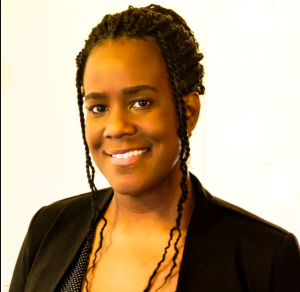Felecia Smith’s primary job is to help ensure that individuals who are Deaf and Hard of Hearing can get access to information. Her main objective for becoming a Virginia Telehealth Network member is to educate health care providers of their obligations to Deaf and Hard of Hearing patients and the ways in which their practices can connect to those with hearing loss.

Felecia is the Virginia Relay Manager for the Virginia Department for the Deaf and Hard of Hearing (VDDHH). Virginia Relay is a free public service that enables people who are Deaf, Hard of Hearing, Deafblind, or speech disabled to communicate with standard telephone users. And that includes physicians, nurses, and the full gamut of health care providers. She points out that many health care providers are not aware that they are legally required to provide patients who are Deaf and Hard of Hearing with accommodations that will allow them to communicate with their offices.
A recent “Dear Colleague” letter from the U.S. Department of Justice makes the obligation clear in keeping with the Americans with Disabilities Act. “Health care providers are required to ensure that communication with people with disabilities is as effective as communication with people without disabilities,” says the letter. “Health care providers are required to take affirmative steps including furnishing appropriate auxiliary aids and services, such as a qualified sign language interpreter to individuals who are Deaf or Hard of Hearing …”
Many health care practices make a TTY phone line available for patients with hearing loss, a technology that has been around for more than a half century. However, TTY is only one type of relay service that is available to the Deaf and Hard of Hearing community. The question now becomes “How can we ensure that telehealth services are accessible to individuals across the Commonwealth who rely on the services provided through Virginia Relay as well as other types of relay services?” The answer is not always straightforward.
“What ‘effective communication’ looks like depends on the individual needs of each patient,” says Felecia. “A lot of medical practices and providers are not familiar with or aware of the fact that relay services are available. An additional issue arises, specifically with telehealth, when providers erroneously believe that the presence of a Communication Assistant (CA) or an American Sign Language interpreter during a telehealth visit is a HIPAA violation, when actually it is not. So, there’s a lot of education that still needs to happen with regards to providers truly understanding the needs of patients who utilize relay services for their telecommunication needs.”
Which means that accommodations for patients who are Deaf, Deafblind, and Hard of Hearing can’t be an afterthought but need to be built into a practice’s systems. Providers need to have protocols in place for ensuring effective communication with patients who utilize Virginia Relay for their access to telehealth services. In addition to relay services, many patients with hearing challenges, who communicate using American Sign Language (ASL), utilize Video Relay Services (VRS) for their telecommunication needs. Ensuring that telehealth portals, processes, and protocols allow for the presence of a Communication Assistant (CA) through Virginia Relay or an ASL interpreter through VRS is absolute imperative to ensure that residents who are Deaf, Deafblind, and Hard of Hearing across the Commonwealth have full and equivalent access to telehealth systems.
“We have a multitude of people in the state of Virginia who utilize relay services to call their doctors or to have their telehealth appointments,” Felecia says. “My goal for becoming a member of the Virginia Telehealth Network is to make sure that providers are aware of what their Deaf, Deafblind, and Hard of Hearing patients’ needs are, so when they’re building their systems, they’re creating space that provides functional equivalence for all.”
In an effort to improve the experience of relay users, Virginia Relay offers a free Virginia Relay Partner training (virtual or onsite) to any business or organization in the Commonwealth. This training is designed to both eliminate hang-ups that many Relay users experience as well as increase awareness and understanding around receiving and placing Relay calls. For more information or to sign up for Virginia Relay Partner training, click here.
Additionally, practitioners can learn more about their obligations in serving Deaf and Hard of Hearing patients through this useful link

